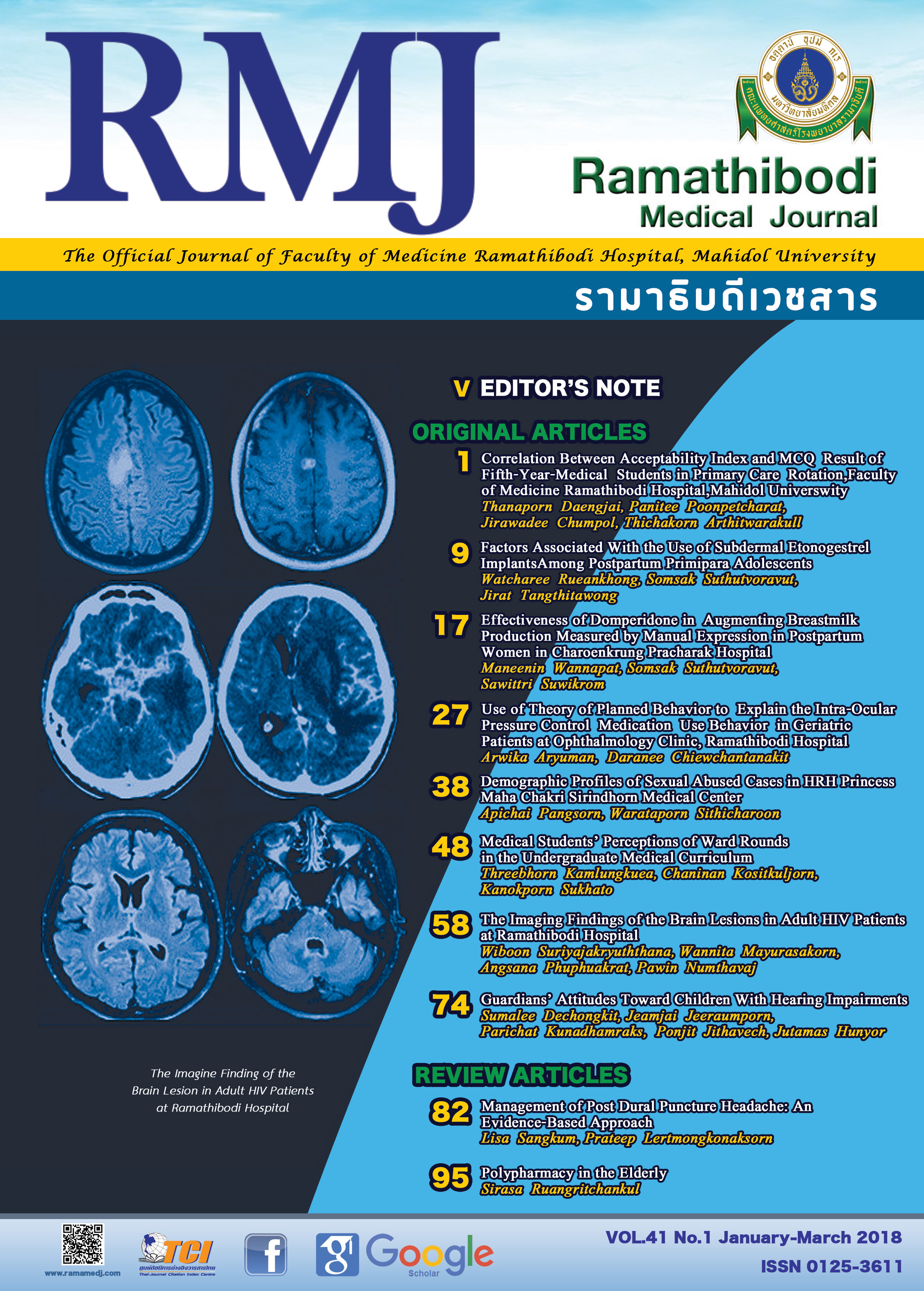Editor's Note
Abstract
ประเด็นปัญหาจากการติดตามดูแลการดำเนินการวิจัยที่ผิดจรรยาบรรณ (Research misconduct) ซึ่งกำลังเป็นปัญหาทั่วโลกในขณะนี้ โดยหน่วยงานภาครัฐและสถาบันการศึกษาต่างๆ ในสหรัฐอเมริกา ได้มีการจัดตั้งหน่วยงานเพื่อติดตามดูแลอย่างต่อเนื่อง
ปัญหาดังกล่าวเป็นอย่างไร? ผมขอนำเสนอกรณีตัวอย่างที่เกิดขึ้นในสหรัฐอเมริกา เพื่อให้ท่านผู้อ่านรับทราบและตระหนักถึงปัญหาดังกล่าว
เรื่องเกิดขึ้น ณ Duke University ซึ่งเป็นมหาวิทยาลัยที่มีชื่อเสียงแห่งหนึ่งในสหรัฐอเมริกา โดยเริ่มต้นจากปี ค.ศ. 2006 นักวิจัยชื่อ Anil Potti จาก Duke University ได้ตีพิมพ์บทความลงในวารสารชั้นนำหลายฉบับติดต่อกันถึง 3 บทความ ได้แก่ บทความเรื่อง A genomic strategy to refine prognosis in early-stage non-small-cell lung cancer ตีพิมพ์ในวารสาร New England Journal of Medicine1 บทความเรื่อง Genomic signatures to guide the use of chemotherapeutics ตีพิมพ์ในวารสาร Nature Medicine2 และบทความเรื่อง Gene-expression patterns predict phenotypes of immune-mediated thrombosis ตีพิมพ์ในวารสาร Blood3 โดยทั้ง 3 บทความดังกล่าวนำเสนอเกี่ยวกับการใช้ผลการตรวจยีนในการบ่งชี้ว่ายาเคมีบำบัดใดเหมาะสมกับผู้ป่วยมะเร็งแบบใด ซึ่งเป็นแนวคิด “Precision Medicine” หรือ “การแพทย์แบบแม่นยำ” โดยบทความทั้ง 3 ได้รับความสนใจและการกล่าวถึงอย่างมาก ผู้บริหารจาก Duke University ให้สัมภาษณ์กับสื่อมวลชนว่า ผลงานวิจัยของ Anil Potti เป็นการค้นพบที่เป็น “Holy Grail” ทางการแพทย์เลยทีเดียว4 (Holy Grail คือ ถ้วยศักดิ์สิทธิ์ที่พระเยซูใช้ดื่มก่อนเสียชีวิต ตามตำนานในศาสนาคริสต์เชื่อกันว่าบรรจุน้ำอัมฤต เป็นสาเหตุหนึ่งในสงครามครูเสด)
สิ่งที่เกิดขึ้นตามมาคือ มีการดำเนินการวิจัยแบบการทดลองทางคลินิก (Clinical trials) จำนวน 3 โครงการ โดยอ้างอิงจากผลการวิจัยของ Anil Potti จาก Duke University
แต่แล้วในปี 2010 ได้เกิดปัญหาขึ้นจากสาเหตุ 3 ประการ ดังนี้
1) มีการเปิดเผยว่า Anil Potti ได้อ้างอิงข้อมูลที่เป็นเท็จว่าได้รับทุนวิจัยจาก Rhodes Scholar หลายทุน5 (Rhodes Scholar เป็นทุนสำหรับนักศึกษาต่างชาติที่มีเกียรติมากที่สุดของ University of Oxford)
2) มีนักชีวสถิติจาก University of Texas MD Anderson Cancer Center ตีพิมพ์บทความลงในวารสาร Annual of Applied Statistics โดยระบุว่า มีข้อสงสัยว่างานวิจัยของ Anil Potti มีความคาดเคลื่อน6
3) มีนักศึกษาแพทย์ชื่อ Bradford Perez จาก Duke University ซึ่งได้ไปร่วมทำวิจัยกับทีมของ Anil Potti ร้องเรียนว่า มีการทำวิจัยที่ไม่น่าเชื่อถือในห้องปฏิบัติการของ Anil Potti7
ผลจากการร้องเรียนและการเผยแพร่ข้อมูลในสื่อต่างๆ ทำให้ Duke University ตัดสินใจระงับการวิจัยแบบการทดลองทางคลินิกทั้ง 3 โครงการ8 ซึ่งผลกระทบที่ตามมาคือ Duke University ถูกฟ้องร้องมากมายจากผู้ป่วยโรคมะเร็งที่ได้รับการเชิญชวนเข้าร่วมโครงการวิจัย นอกจากนี้ เหตุการณ์ที่ Duke University ทำผิดพลาดคือ ผู้บริหารได้เรียกพบนักศึกษาแพทย์ Bradford Perez และกดดันให้ปกปิดสิ่งที่พบ6 แต่นักศึกษาดังกล่าวก็ได้เปิดเผยข้อมูลให้กับหน่วยงานของรัฐทราบ
ผลการสอบสวนของ Anil Potti โดย Office of Research Integrity ของ U.S. Department of Health and Human Services ในสหรัฐอเมริกา ระบุชัดเจนว่า Anil Potti ได้ทำการปลอมแปลงและบิดเบือนข้อมูลในรายงานการวิจัยจริง9 เป็นผลให้วารสารต่างๆ ทยอยถอนผลงานตีพิมพ์ (Retraction) บทความของ Anil Potti และ U.S. National Institute of Health (NIH) ซึ่งเป็นหน่วยงานให้ทุนวิจัยที่สำคัญที่สุด ได้เข้ามากำกับดูแลการให้ทุนวิจัยของ Duke University ซึ่งไม่เคยมีการดำเนินการเช่นนี้มาก่อน10
จากกรณีตัวอย่างที่เกิดขึ้นจริงนี้ ท่านผู้อ่านคงจะสังเกตเห็นว่ามีประเด็นปัญหาอะไรบ้าง ประการแรก คือ การปลอมแปลงหรือบิดเบือนข้อมูลในรายงานการวิจัย แม้แต่วารสารชั้นนำก็ไม่สามารถตรวจพบได้ และประการที่สอง คือ ผู้บริหารจาก Duke University จัดการกับปัญหาของการร้องเรียนได้ไม่ดี ทำให้เรื่องจบอย่างไม่สง่างาม ผมหวังว่าท่านผู้อ่านจะได้ประโยชน์จากกรณีตัวอย่างที่นำเสนอนี้และเข้าใจว่าการจัดตั้งหน่วยงาน Office of Research Integrity and Compliance (ORIC) เพื่อติดตามดูแลกรณีที่มีการดำเนินการวิจัยที่ผิดจรรยาบรรณมีความสำคัญอย่างไร
References
Potti A, Mukherjee S, Petersen R. A genomic strategy to refine prognosis in early-stage non-small-cell lung cancer [retracted in: N Engl J Med. 2011;364(12):1176. doi:10.1056/NEJMc1101915]. N Engl J Med. 2006;355:570-580.
Potti A, Dressman HK, Bild A. Genomic signatures to guide the use of chemotherapeutics [retracted in: Nat Med. 2011;17(1):135. doi:10.1038/nm0111-135]. Nat Med. 2006;12(11):1294-1300.
Potti A, Bild A, Dressman HK. Gene-expression patterns predict phenotypes of immune-mediated thrombosis [retracted in: Blood. 2011;118(16):4497. doi:10.1182/blood-2011-08-375030]. Blood. 2006;107(4):1391-1396.
Deception at Duke: Fraud in cancer care? CBS News. https://www.cbsnews.com/news/deception-at-duke-fraud-in-cancer-care/. Published March 5, 2012. Accessed March 31, 2018.
Kaiser J. Prominent Duke cancer researcher put on leave over allegedly embellishing credentials. Science. https://www.sciencemag.org/news/2010/07/prominent-duke-cancer-researcher-put-leave-over-allegedly-embellishing-credentials. Published July 19, 2010. Accessed March 31, 2018.
Baggerly K, Coombes K. Deriving chemosensitivity from cell lines: Forensic bioinformatics and reproducible research in high-throughput biology. Ann Appl Stat. 2009;3(4):1309-1334.
Goldberg P. Duke officials silenced med student who reported trouble in Anil Potti's lab. The Cancer Letter. https://cancerletter.com/articles/20150109_1/. Published January 9, 2015. Accessed March 31, 2018.
Singer N. Duke suspends researcher and halts cancer studies. New York Times. https://prescriptions.blogs.nytimes.com/2010/07/20/duke-suspends-researcher-halts-cancer-studies/. Published July 20, 2010. Accessed March 31, 2018.
ORI Case Summary: Potti, Anil. U.S. Department of Health and Human Services. https://ori.hhs.gov/content/case-summary-potti-anil. Accessed March 31, 2018.
McCook A, Retraction Watch. Duke’s mishandling of misconduct prompts new U.S. government grant oversight. Science. https://www.sciencemag.org/news/2018/03/duke-s-mishandling-misconduct-prompts-new-us-government-grant-oversight. Published March 23, 2018. Accessed March 31, 2018.













